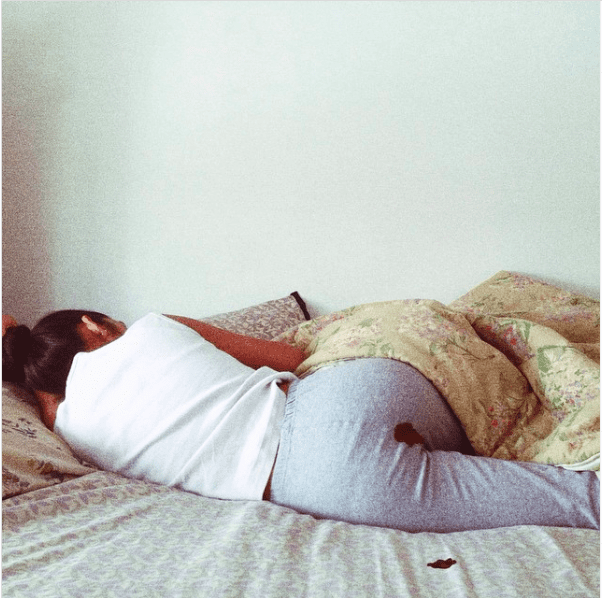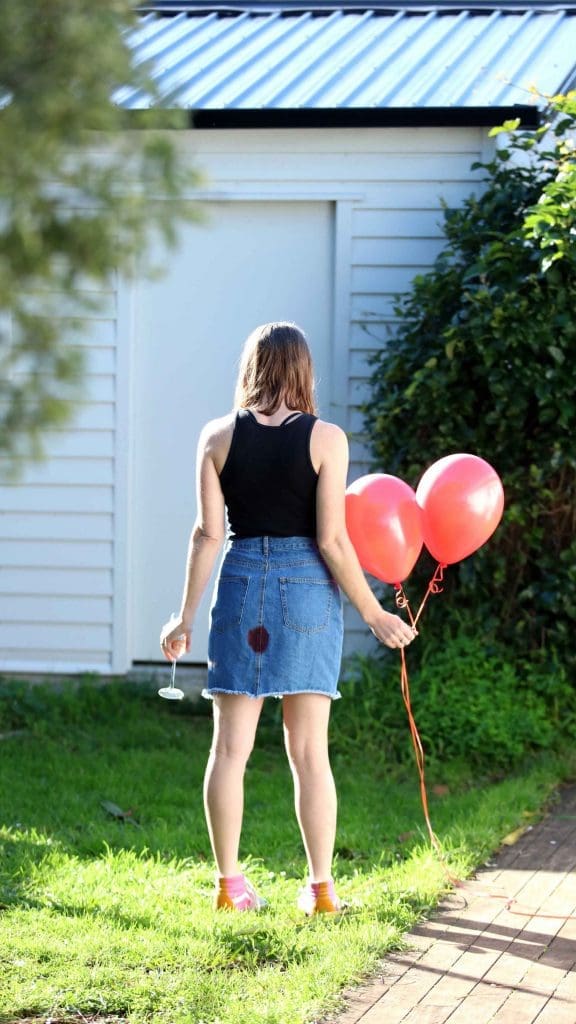Today is Period Action Day and the message is simple: it’s time to celebrate our periods, not shun them. For documentary maker Rachel Judkins, she was happy talking about any topic under the sun – apart from her period. So, she decided to tackle it head on and create a documentary about it. She talks to Capsule about her doco About Bloody Time and why we all need to get better about talking all things period-related.
When you consider that about half the world will menstruate at some point in their lives – and that for those that do, it’s a monthly event, it does seem a bit nuts that the whole topic of periods is still considered to be a bit hush hush. From making up excuses to hide period cramps, to smuggling tampons up our sleeves to the bathroom, as if they’re a weapon, there are many layers of secrecy and shame to old Aunt Flo. For Rachel Judkins, there were very few topics that weren’t considered open season in her personal life – apart from her period. So it was a surprise to her as much as anyone that she decided to go a full 180 and then make a short documentary for Loading Docs about exactly that.
As a researcher, Rachel was used to working on other people’s documentaries and knew one day she wanted to do her own. The theme for Loading Docs in 2020 was “revolution” and it sparked an unlikely idea in her mind, which led to her eight-minute documentary About Bloody Time.
“It felt like there was a menstrual revolution happening around the world – people are talking about it more, people are exploring it through art – but It wasn’t happening in my own personal life. Initially I thought ‘how can I make a doco about this when I can’t even talk to my own husband about this?’ but then it was almost easier to do it that way, to invite a camera crew into my house than it was to just sit down and have that conversation by itself. There is something about a constructed situation that makes it sometimes easier to share.”
In the documentary, which is available now online, Rachel films herself having a series of conversations with her husband, her kids and her own mum about a relatively untouched subject: periods. And not just in general, but the specifics – the emotions, the mess, the whole kit and caboodle. “With Mum and I – we’d never really talked about it, apart from the very brief ‘here are some tampons’ chat early on. But in this conversation, we had a full hour where we didn’t stop talking because once we started, we both had so much to share but we never thought to do it.”
Period conversations may be slowly becoming more normal amongst friends and families, but on the global context, it’s still a topic that gets given the silent treatment. Menstrual blood is banned on Facebook – it’s one of the reasons that you don’t see any actual blood in the documentary, as it needed to be okay to be shared on that platform. When you consider all the things that aren’t banned on Facebook… that’s quite a surprise. Consider the facts that any menstrual pads or tampons advertisement uses (inexplicably) blue liquid, even though we all know they’re talking about blood. Blood is everywhere – unless it’s menstrual blood, and then it’s a no no.

in 2015, the poet Rupi Kaur made headlines by sharing a photo of herself bleeding on Instagram (above) – a post that swiftly was banned until she pointed out the hypocrisy. The value of seeing images like Rupi’s is instrumental, Rachel says. “When I saw that photo – and this will sound crazy, as a 40-year-old woman – it was the first time I thought ‘oh my God, I’m not the only person who sometimes leaks at night.’ Before that, it had never occurred to me that anyone else was dealing with that. It made me feel a lot more normal.”
“With that happening more often, girls growing up now will start to see those conversations happening all the time – organically. But I also don’t’ think we can get complacent – we have to keep working to ensure it’s okay.”
The 10th of October is Period Action Day and Rachel is thrilled that her documentary is helping start conversations about periods – ironically, considering her own past reticence to discuss it. “Everyone talks to me about their periods now,” she laughs. “I was at a party on Saturday night and I had complete strangers coming up to talk to me about their period because they’d seen the doco.” She cites a conversation she had with one woman who works in the menstrual health field, who referred to actions of ‘everyday activism’. “That can include not hiding a tampon up your sleeve when you take it to the bathroom, but holding it like a lighter, or your keys. It’s something any of us can do – and it might feel intense or subversive at first, but when we all do those tiny things, it will make a big difference.” Another way to help is the next time you give tinned food to a food bank or food collection point at your supermarket, throw in a packet of tampons as well. Period poverty is a huge symptom of financial inequality – when people miss out on school or work because they can’t afford menstrual products.


And then there’s also the internalised misogyny so many of us have where we don’t feel like we can slow down or complain about our periods, lest we be contributing to the stereotype that menstruation makes us ‘weaker’ than those who don’t. In the conversation Rachel has with her husband, she gets emotional when she talks about how, well, emotional her period can make her. “I used to really give myself shit for the emotional stuff – so not only was I feeling like shit and really sad and emotional, I would then beat myself up for feeling sad and emotional! Whereas now I’ve realised that by bringing all those emotions up to the surface and sitting with them, I actually feel amazing afterwards because I’ve got it all out of my system.”
“You just carry on through life and go through things that are really hard and stressful all the time and you just keep ploughing on… but then actually letting that go and having a good cry is really cathartic and healthy. So now, when it happens, not only am I like ‘Oh, I know what’s going on here, I see you, crazy hormones,’ but now I actually just allow it to happen and then set the reset button… I went on a whole journey with this and have gotten over a really big thing in my life – and it was from bringing it up and then having people respond and say ‘me too.’ It’s been hugely healing!”
For more information on About Bloody Time, click here or watch the full eight-minute documentary below!

